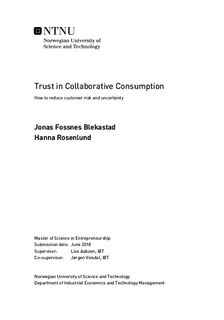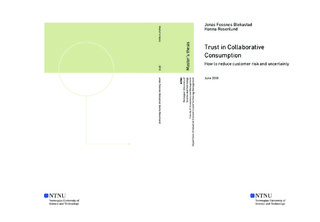| dc.description.abstract | New services in the domain of collaborative consumption (CC), also known as the sharing economy have in recent years revolutionised their industries. Different from more traditional services, CC services introduce additional risk among the participating parties. These risks are leading to uncertainties and barriers for using the service. To overcome the perceived risk, building trust among the involved parties is essential. Trust is by some researchers even considered the currency of CC services. Despite this, research on antecedents of trust in CC is still extremely rare.
The purpose of the study has been to investigate influencing factors for customers to trust CC sharing services. To answer the purpose, we have formulated the following research questions:
RQ1: How do customers perceive risk and uncertainty in CC sharing services?
RQ2: How do different trust mechanisms affect customers perceived risk and uncertainty in CC sharing services?
To fulfil the purpose of the study, we have chosen a mixed method single-case research design, with both a qualitative and quantitative approach. The method consists of a triangulation between 10 customer interviews, a manager interview and a survey with CC customers (n=100). As there is lack of qualitative research in previous literature, the qualitative method has received the primary focus in this thesis. Summarised, the mixed method research design has enabled us to acquire an in-depth understanding of customers perceived risks and uncertainties, and how different trust mechanisms influence customers trusting beliefs.
The insight gained from this thesis has provided more clarity to discussions on the legitimacy of reputational systems, the importance of a high-quality website as a trust-building measure and other trust mechanisms. Furthermore, we have addressed several gaps in the literature; on the formation of trust, the formation of customer expectations and finally, the relationship between risk and trust. To the best of our knowledge, this is the first study that investigates customer risk and trust mechanisms with focus on a qualitative method in the context of CC. By applying the theoretical framework in the analysis, we have connected existing literature to our findings and revealed new research areas. Furthermore, this study has provided existing and future managers of CC services with actionable measures. | |

